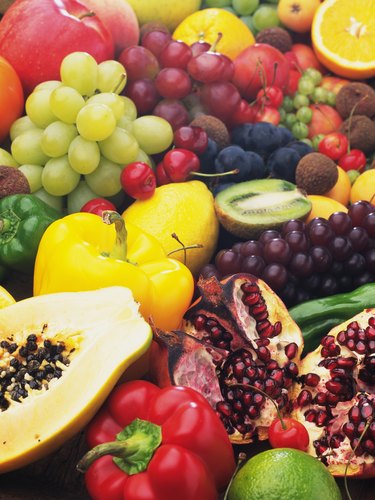
Once you take that first bit if food, it goes to your stomach where it is broken down and sent through your digestive system -- traveling into your small and large intestines. Your body absorbs what it needs and eliminates what it doesn't need through your stool. Your digested food needs bulk to move along through your digestive system -- this is where fiber comes in. Gradually increasing your fiber intake may help to stimulate your bowels. Always speak with your physician about increasing your fiber intake to ensure it will not interfere with any medications you are taking.
Types of Fiber
Video of the Day
Dietary fiber falls into two categories: soluble and insoluble. Soluble fiber is found in apples, citrus fruits, carrots and beans, and dissolves to create a gel-like paste. This fiber helps to slow the digestive process and keep your blood sugar at a steady level. Insoluble fiber affects your bowel movements because it remains unchanged in your body, adding bulk to your stool. Examples of insoluble fiber foods include whole-wheat flour, nuts and many vegetables, such as cauliflower and turnips.
Video of the Day
The Action of Peristalsis
Your digestive system moves digested material through your body via a system known as peristalsis, which is a wave-like motion. While your digestive system naturally engages in peristalsis, the more bulk your stool has, the better and faster it will move through your system. The walls of your intestines can push against the stool and send it on its way, helping you maintain digestive regularity. If you aren't getting enough fiber in your diet or often experience constipation, increasing fiber could help stimulate peristalsis.
Recommended Intake of Fiber
If you experience diet-related constipation, you can take two steps to improve the frequency of bowel movements -- increase your fiber and water intake. The increased insoluble fiber absorbs water as it travels along your digestive pathway, helping you to maintain regularity. The amount of fiber you need in your daily diet varies based on your overall health. As a general rule, men aged 50 and younger should have 38 grams of fiber per day, while women should eat 25 grams. Men aged 51 and older should eat 30 grams per day, while women should eat 21. Examples of a fiber-filled day could include starting with a whole-grain cereal, eating a serving of fruit with every meal and incorporating beans with lunch and dinner. While you're increasing fiber, don't forget to drink plenty of water. The right amount varies based on your activity level, overall health and climate, according to the August 2010 issue of "Nutrition Reviews." As a general rule, if you rarely feel thirsty, your urine is clear to pale yellow and are drinking about eight 8-ounce glasses of water a day, you are likely drinking enough.
Something to Consider
Increasing your fiber intake can speed up the rate at which your stool passes through your digestive tract, but you must use caution when increasing your fiber. Adding too much too soon can overload your digestive tract, causing fiber to pass through too quickly and resulting in gas, bloating and cramping. Increase your fiber intake gradually, adding a new serving every week until you reach your recommended intake.